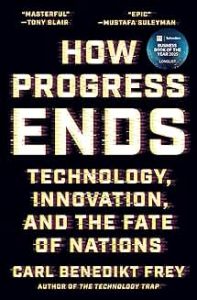Carl Frey’s How Progress Ends: Technology, Innovation and the Fate of Nations is the kind of book that is exactly my cup of tea. I did have the opportunity to read it before publication and part of my blurb comment was: “How Progress Ends is a fascinating account of the way culture and institutions interact with new technologies.” The major part of the book consists of the history of some major technological advances along with some significant innovations in societal models (the American Revolution, Soviet central plannng) exploring exactly this interaction.
The thing that makes institutions and culture matter is that general purpose technologies – printing, steam, electricity, telecommunications – is their disruptive character. The affordances of the technologies enable challenges to the established economic or political order. Sometimes the incumbents can resist successfully – as in China’s ‘reversal of fortune’ following the formation of the Qing dynasty, or in the Soviet elite’s resistance to reform until it was too late. Sometimes the character of technology means political competition enables it to advance faster than if there were political centralisation – and sometimes the other way round.
States can therefore play a decisive role in whether their societies experience and (eventually) benefit from technological progress. The book ends with some reflections about the present. Frey is pessimistic about both the US and China (a bit of an echo of Dan Wang here). In the US he sees the incumbent AI companies and their relationship with the government as freezing out innovation: “Reaping the benefits of technological change requires institutional support to make space for exploration.” In China he sees future innovation as falling victim to cronyism and the assertion of control by the central government. “The decline of either China or the United States is by no means inevitable,” he writes, although one senses he thinks it is.
Who knows. What does seem clear is that the path taken by technology cannot be divorced from the politics, which is highly uncertain everywhere. The historical lessons are well worth pondering. How Progress Ends is well worth reading alongside for example Carlotta Perez (Technological Revolutions and Financial Capital) and Bill Janeway (Doing Capitalism in the Innovation Economy) to reflect on the current moment.

